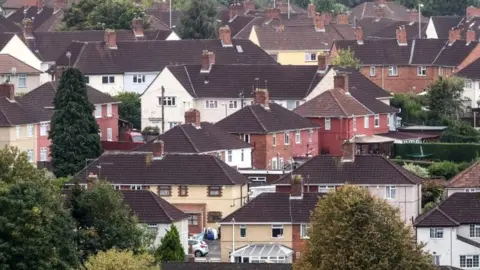Government U-turn on housing benefit cap for social tenants
 Getty Images
Getty ImagesThe government is set to drop plans to cap housing benefit for people living in social rented accommodation, Theresa May has announced.
From April 2019 the amount they get was to be made the same as those in private rented homes.
But providers of homes for people needing medical care warned it could put the vulnerable and elderly at risk.
At Prime Minister's Questions, Theresa May said full details of the new policy would be announced on Tuesday.
She added: "But I can also say today that as part of our response to the review, we will not apply the local housing allowance cap to supported housing.
"Indeed, we will not be implementing it in the wider social rented sector, and the full details will be made available when we publish our response to the consultation."
The PM was greeted with cheers as she announced the policy change, which came ahead of a Labour-led Commons debate on the issue.
'Cruel and heartless'
Labour's shadow housing minister John Healey said: "Once again, Labour is winning the arguments and making the running on government policy."
He said the "devil will be in the detail, and the funding" of the government plans and his party would continue to press ministers to "protect the long-term future and funding of supported housing".
Plans to make social tenants get the same amount of housing benefit as private tenants - as dictated by the Local Housing Allowance (LHA) - were originally announced by then Chancellor George Osborne in 2015.
The Local Housing Allowance has many of the same rules as housing benefit, but there are some extra rules that limit the amount of help people can get for a private rented home.

Who would have been affected?
Housing association tenants would have borne the brunt of the planned changes, as they tend to have higher rents than those living in council houses.
A 2015 analysis by The Institute for Fiscal Studies found 800,000 households would lose an average of £1,300 per year.
Separate research by the National Housing Federation in 2016 suggested tenants claiming housing benefit in London would have faced the largest weekly shortfall.
About 14% of them would have been out of pocket to the tune of £31.59 a week.
The lowest losses would have been in the North-East of England, where 21% of tenants would have faced a £14.51 weekly shortfall, according to the NHF analysis.
The IFS said the policy would have saved the government £205m a year in 2018/19 rising to £375m in 2020/21.

There were concerns the plan could lead to rent arrears and increase the risks of people becoming homeless.
But most of the criticism has focused on supported housing, with concerns it would be made completely unaffordable.
Mrs May said the government needed to ensure the funding model was right "so that all providers of supported housing actually are able to access funding effectively" and to deal with recent increases in service charges.
David Orr, Chief Executive at the National Housing Federation, said: "I know all social housing tenants will be relieved with the news.
"Things are really starting to change and it is great to see social housing getting the right kind of attention it deserves."
Liberal Democrat MP Wera Hobhouse said: "This cap would have hit the most vulnerable in our society, including the homeless and victims of domestic violence living in shelters.
"It is right that the government has U-turned on this cruel and heartless policy."
